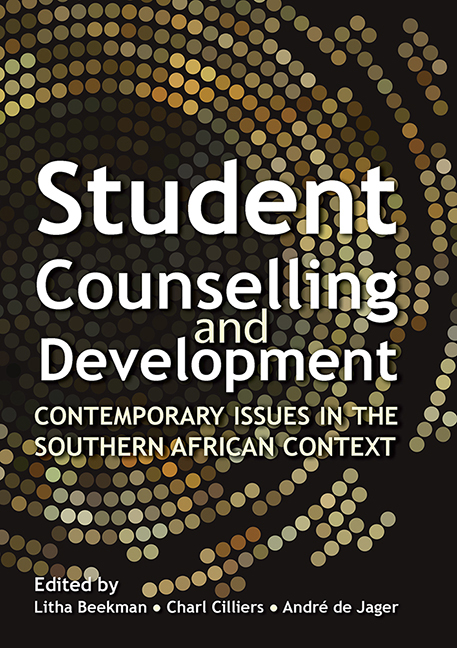Book contents
- Frontmatter
- Contents
- Figures
- Tables
- Preface
- Section 1 Development of Student Counselling and Development in Southern Africa
- Section 2 Theoretical Foundations of Student Counselling and Development in Higher Education
- Section 3 Services and Programmes Provided by Student Counselling and Development Units
- Section 4 Student Counselling and Development For Special Groups
- Section 5 Quality Assurance and Ethical and Professional Issues
- Contributors
- Index
Chapter 14 - Counselling Students in Open and Distance Learning
Published online by Cambridge University Press: 22 February 2020
- Frontmatter
- Contents
- Figures
- Tables
- Preface
- Section 1 Development of Student Counselling and Development in Southern Africa
- Section 2 Theoretical Foundations of Student Counselling and Development in Higher Education
- Section 3 Services and Programmes Provided by Student Counselling and Development Units
- Section 4 Student Counselling and Development For Special Groups
- Section 5 Quality Assurance and Ethical and Professional Issues
- Contributors
- Index
Summary
INTRODUCTION
The history of distance education goes back to the 1800s and has gone through different stages of development up to the 21st century where it provides some answers to the challenges of the post-industrial era. Leaders and student counsellors in distance education need to understand the changes that have taken place in the philosophy of distance education, pedagogies, understanding of learning, and the radical growth of technology if they want to plan and provide a relevant service to students in higher education (HE).
Distance education has changed enormously during the centuries as a result of changes in the world at large. The transformation from an industrial era with mass production of standardised goods by “routine producers” (factory workers) has changed to a post-industrial era of “in-person servers” (service providers, such as hairdressers and doctors) in a “service economy”, and “symbolic analysts” in “Information Age” jobs characterised by independent work using communication and information-processing technologies (Proefrock, 2005, p. 20). Computer technology has revolutionised and modernised the world.
Philosophy and pedagogy have changed as the world has moved from modernism to post-modernism in the 21st century. Post-modernism is transforming the way we think, understand, and live in a “knowledge-saturated society and in a changing culture” (Bloland, 2005, p. 126). When referring to the post-modernist era, terms, such as “globalisation”, “information age”, “post-industrial”, “reflexivity”, “lifelong learning” and “knowledge revolution” are part of the discourse of academics and student counsellors and have also become part of the lexicon of the developing world. Post-modernism signals the emergence of a period of multiple changes in society, the rise of a post-industrial order, limitless choices, consumerism, turbulence and the creation of a dynamic external environment where the dominant forces are information and communication technologies (ICT) and scientific and technological advancement (Bloland, 2005; Taylor, 2001).
ICT has changed the lives of millions of people and the way HE is structured, generated, and distributed globally and locally because “the internet produces time-space compressions that erase almost all sense of information boundaries” (Bloland, 2005). Internet and e-learning enable HE to reach out to geographical areas and to sections of the population previously unreached on an unprecedented scale (Daniel, 2005). The application of ICT to education has changed the pedagogic assumptions upon which distance education is founded.
- Type
- Chapter
- Information
- Student Counselling and DevelopmentContemporary issuesin the Southern African Context, pp. 257 - 269Publisher: University of South AfricaPrint publication year: 2012



